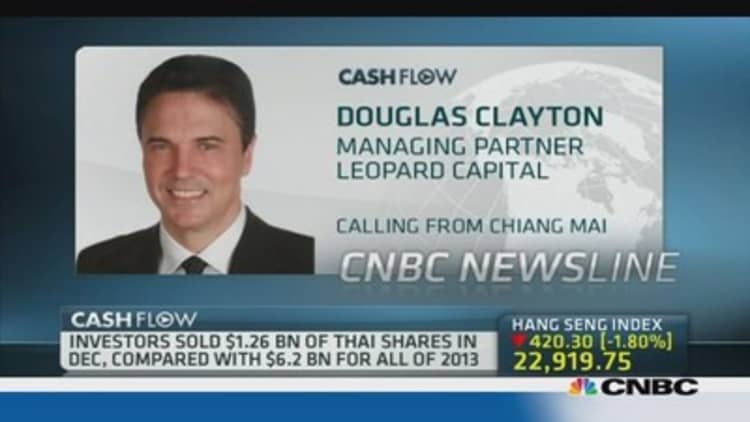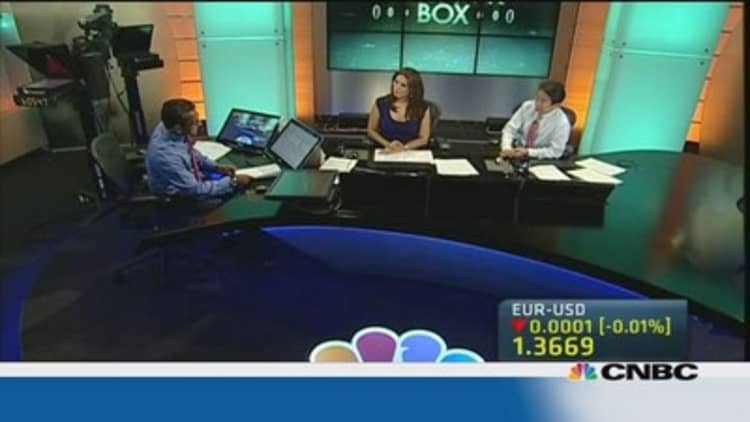As Thailand's anti-government protestors mass in Bangkok for Monday's planned mass protest, signs are emerging they are likely to get their demand for an unelected government, analysts said.
"Elections will almost certainly fail to resolve any of Thailand's conflicts even if they happen," Credit Suisse said in a note. "We now see judicial intervention to appoint an unelected caretaker government as the single most likely scenario."
(Read more: As Bangkok 'shutdown' looms, Thailand's 'Teflon' economy put to the test)
Protests to date have been large, but they've also been in relatively isolated areas of Bangkok. On January 13, that may change, with protestors vowing to "shut down" the capital city with plans to blockade main roads.
The protests, which began in late October, were triggered by parliament's consideration of a government-backed amnesty bill that could have allowed former Prime Minister Thaksin Shinawatra, who was ousted in a 2006 coup d'etat, to return home without facing time in prison for a 2008 graft sentence. The bill also would have granted immunity to politicians implicated in 2010 violent protests which killed about 90 people.
While that bill was dropped, the street protests have broadened out to an explicit call for Prime Minister Yingluck Shinawatra, who is Thaksin's sister, to step down.

In addition, protesters are calling for replacing their country's democracy with an unelected "people's council" for an undefined period of time.
In early December, Yingluck called a snap election, set for February 2, in an unsuccessful effort to defuse protests. Since then, the main opposition, the Democrat party, has said it will boycott the election and protestors have prevented candidates from registering.
"The current government has only temporary caretaker status," Credit Suisse said. "If circumstances prevented a new parliament from being formed, a new prime minister could not be elected, and the current cabinet would fall into legal limbo. The constitution provides no guidance as to what happens if a caretaker government loses its legal status, but we suspect that the Constitutional Court would ask the King to replace it with an unelected caretaker government."
(Read more: Why you shouldn't pounce on Thai shares yet)
A number of factors are likely to prevent the election from resulting in a new parliament. For one, under the current constitution, at least 475 seats out of a total 500 must be filled, but protestors prevented any candidates from registering in 28 districts.
Credit Suisse also noted another ironic issue likely to prevent the elections from succeeding: "On election day, protestors could block voters from reaching polling sites. Anti-government forces could then petition courts to invalidate elections on the basis that some voters had been denied access to the polls."
The bank's analysts expect judicial intervention could come anytime from this month through early March, marking the end of the 30-day post-election period for forming a government.
(Read more: )

"We see a significant risk that another multi-year cycle of political instability has begun," Credit Suisse said.
"Judicial intervention brought down the last pro-Thaksin government in 2008 under similar circumstances," the bank said. "If the courts ousted the current government, we would see a high risk of pro-Thaksin Red Shirt protesters replacing the anti-Thaksin protestors on the streets," it added.
Credit Suisse isn't alone in expecting the democratic government's days are numbered.
"A survey of local funds indicates that a third of them believe that a resolution will eventually come in the form of a royally appointed government. We agree with their assessment," Athaporn Arayasantiparb, an analyst at UOB-KayHian said in a note.
(Read more: Why Thailand's political strife is far from over)
Some still expect the election process to play out, albeit far more slowly than usual.
"From what we have been hearing, it could be as far as October of this year (before there's a government)," Nithi Wanikpun, an analyst at Nomura, told CNBC. "That process can be dragged on until later because we have six months from February 2 to get enough members of parliament," he said.
"The Election Commission will be obliged to run a by-election or re-election in those 28 districts (without candidates) until we get more than 95 percent (of the total seats filled)," he said. "That would be an ongoing process. The law allows more than six months."
(Read more: Thailand's investors spooked by 'forgiveness')
But he added, if after six months there still aren't enough members of parliament, "I don't know what would happen."
While many in Bangkok are bracing for Monday's protests, with protestors vowing to shut down the city, Nithi is more sanguine, noting it isn't clear what "shutting down the city" means.
"If shutting down the city means people cannot go to work, it'll be difficult to prevent people going to work," he said, noting the city's alternate methods of transportation. "If it means nothing will be open, at least as far as I know, the main shopping centers in downtown Bangkok will be open," he said. "We're taking things day-to-day."
—By CNBC's Leslie Shaffer; Follow her on twitter @LeslieShaffer1

